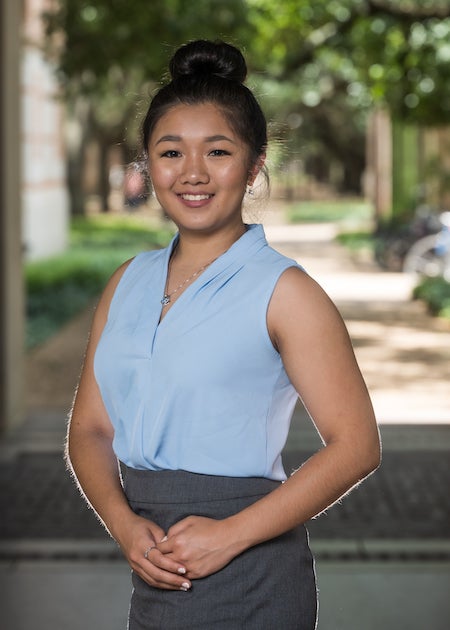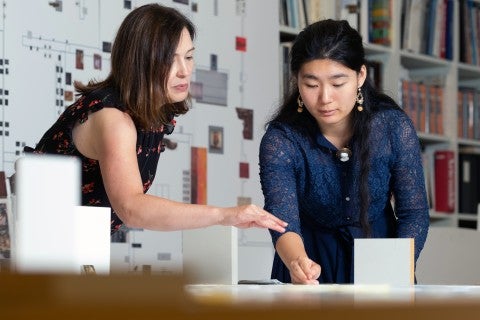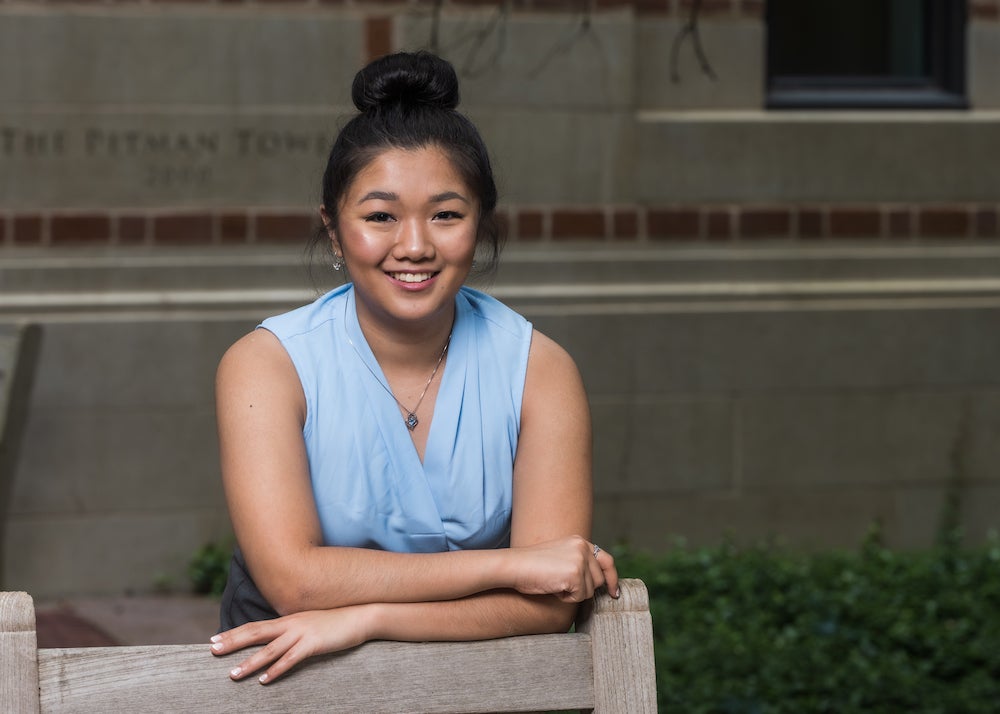As she prepares to pursue her PhD in history at Georgetown University this fall, history major Victoria Saeki-Serna ’22 (Baker College) reflects on the lessons she’s learned from her innovative and interdisciplinary undergraduate research experiences.
Born in Mexico City and raised in Round Rock, Texas, Saeki-Serna wanted her studies at Rice to be an academic bridge between the two nations she called home. In her first year, she enrolled in a course on Mexican history taught by Moramay Lopez-Alonso, associate professor of history and undergraduate advisor for the Poverty, Justice and Human Capabilities (PJHC) minor. Lopez-Alonso says it was serendipitous to cross paths with a first-year student whose research interests aligned so well with her own and decided early on that she wanted to mentor Saeki-Serna by exposing her to several methods of research, teaching and service.
“I wanted to give her a whole tour of what it meant to be a historian from the teaching side to the research part and even the service part,” Lopez-Alonso says. “I do things that are very interdisciplinary and cover many time periods so I felt confident that if she wanted to do something that was related to Mexico, I could guide her in any topic that she wanted.”
By the beginning of her third year, Saeki-Serna found her passion in Latin American political history and was drawn to the qualitative and interdisciplinary nature of the Politics, Law and Social Thought (PLST) minor. She found that PLST strongly complemented PJHC — together, the two programs revealed the importance of understanding political and social issues not only as an academic, but as a civically engaged member of society.

“PJHC has a lot of emphasis on translating academic principles into the practical world and making sure that you don't look at things purely from a theoretical realm,” says Saeki-Serna. “For instance, when we discussed democracy and human rights, we not only talked about how this looked from a philosophical perspective, but also how these applied to say, NGOs and government officials.
Saeki-Serna’s PLST coursework was an excellent complement to her PJHC coursework. Taken together, the programs’ curriculum reciprocated each other. They enabled her to expertly navigate the bridge between real-world conflicts and the abstract theories that scholars use to understand them.
“PLST helped me root a lot of the practical concepts that we talked about in PJHC in the theoretical realm,” she adds. “We could go back to thinking about, how do we even define democracy? How do we define populism and how do we define totalitarianism? All of those questions that get at the core of what values we need to consider when going into policymaking.”
In 2020, Saeki-Serna saw these important ideas play out in real time as she participated in the Susan McAshan Summer Service Internship offered by PJHC. She worked with Mi Familia Vota, a national organization promoting civic engagement among Latino and immigrant communities, to encourage Latino Houstonians to fill out the 2020 Census. Saeki-Serna was met with widespread misinformation and fear that she tried to redress through canvassing and hosting workshops on elections and the census.
“[The internship] taught me the very practical effects of very real fear,” she says. “I underscored to them that I completely empathize with their fears but that there are practical consequences of not filling out the census. We see communities lacking the resources that they need, lacking the representatives that they deserve.”
As she developed her research focus for her history honors thesis, Saeki-Serna drew on real-world experiences like this as well as the lessons, techniques and interdisciplinary creativity that she learned from her mentors to highlight a perspective that has been historically ignored in scholarly literature.
“Something that was very much underlined throughout my entire time in the PJHC program was the importance of storytelling and taking the perspective of others that are not traditionally highlighted in narratives of politics, history or global discourse at large. And so with that in mind, when I looked at the issue of U.S.-Mexico relations and the Cold War, I really looked into the historiography and realized that a lot of the literature that already existed focused on the U.S. and its perspective.”
In summer 2021, after being delayed by the COVID-19 pandemic, Saeki-Serna traveled to the National Archive of Mexico in Mexico City to conduct archival research for her history honors thesis, “Negotiating Mexican Foreign Policy on Cuba: Between Domestic Interests and the United States, 1959-1964.” She was looking for government records relating to Mexico’s foreign policy with the United States and Cuba in the years immediately preceding and following the Cuban Missile Crisis. After spending weeks meticulously rifling through thousands of index cards, relying on her Spanish language and legal scholarship skills, Saeki-Serna discovered that most of the documents she needed were classified and unavailable for study.
“I realized that there are very real obstacles to putting forward certain narratives. This brought me back to things I learned in PJHC about what inhibits others from understanding and empathizing with other identities and narratives that are not traditionally present in history and politics.”
Upon facing this obstacle in her research, Saeki-Serna thought back to the lessons finding creative solutions that she learned from Lopez-Alonso’s cross-disciplinary research. “Things are not always going to work perfectly and it's okay,” says Lopez-Alonso. “Sometimes you learn more from things that don't work. That proved helpful for [Saeki-Serna] to overcome the obstacles of doors that were closing. Let's find another alternative. Let's find another. And when you do research, that's one way to advance.”
“When it came down to seeing that the archives in Mexico City were largely classified,” Saeki-Serna explained, “I was inspired by [Dr. Lopez-Alonso’s] creativity of thinking — how else could I use the documents that were available? How could I read against the grain to get the information I wanted?”
Saeki-Serna completed her thesis in April 2022, which won an Ira and Patricia Gruber Award for Best Honors Thesis. The project represented a bridge between the many research interests and approaches that Saeki-Serna gathered from diverse avenues of humanistic inquiry, and ultimately emerged as an important contribution to a body of scholarship lacking in Latin American perspectives.
“As I go into graduate school this coming year, I think a very big focus for me is making history research accessible to policymakers with the understanding that you have to take a holistic approach to policy so that you know, we are going forwards and not backwards. Precisely because of the approach that I take of emphasizing more of the Latin American narrative, I also hope to foster that empathy and that storytelling that the PJHC program really underscored to me.”
Out of Saeki-Serna’s many accolades, from her award-winning thesis to her co-editorship of the Rice Historical Review to her acceptance to a PhD program immediately out of her undergraduate studies, Lopez-Alonso says that her mentee’s determination has been the most impressive and inspiring.
“I learned a lot from her resilience,” Lopez-Alonso says. “Even when times were difficult in the midst of COVID, she didn’t lose her voice. She was open to making the most of everything that was available, even if it wasn't going to be perfect all the time.”


